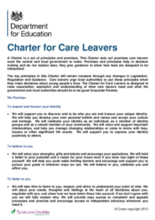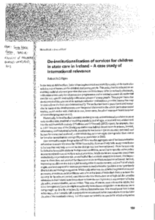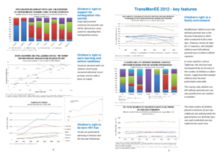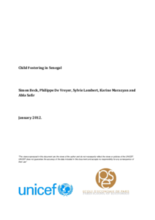Displaying 2011 - 2020 of 2221
This Charter lists the promises that care leavers want the central and local governments to make. The Charter for Care Leavers is designed to raise expectations, aspirations and understanding of what care leavers need and what the government and local authorities should do to be good “Corporate Parents.”
This paper describes Ireland’s successful implementation of a policy of de-institutionalization of out-of-home care for children.
TransMonEE is a database that captures a vast range of data on social and economic issues relevant to the situation and wellbeing of children, adolescents and women in 28 countries of Central and Eastern Europe, Commonwealth of Independent States and the European Union. This document includes inter-country comparisons of data on several issues related to children’s care.
Using a nationally representative household survey conducted in 2006-2007 in Senegal, this study sheds light on the common practice of fostering (confiage) by examining the characteristics of households and individuals involved in fostering, the motivation for fostering and its impact on host households, sending households, and the foster child, with a focus on education, employment and marriage outcomes.
This monograph reviews literature pertaining to children without permanent parents.
Utilizing the United Nations Convention on the Rights of the Child and the Guidelines for the Alternative Care of Children, this paper from Monographs of the Society for Research in Child Development Volume 76, Issue 4 examines critical components and current characteristics of alternative care for children in low‐resource countries.
In December 2011, the Children and Youth Services Review released a special volume (32) focused on "Young People's Transitions from Care to Adulthood."
This article, from the Children and Youth Services Review special issue on ‘Young People's Transitions from Care to Adulthood’ examines the school performance and psychosocial wellbeing of care leavers in Sweden.
Foster youth in the US do not appear to be receiving many forms of help that are called for in federal law. Over one-third did not receive help they would have liked to have received. System factors play a stronger role than individual indicators of need in help receipt. Independent living services should be more widely available and better targeted.
The aim of this article is two-fold. Firstly, to present a critical discursive analysis of young people's accounts of themselves in the transition from care. Secondly, to shed light on three different ways of making the transition from care; transition through a break with the past after moving out, transition through continuing change and transition as a way of dealing with the risk of further problems in their lives.




